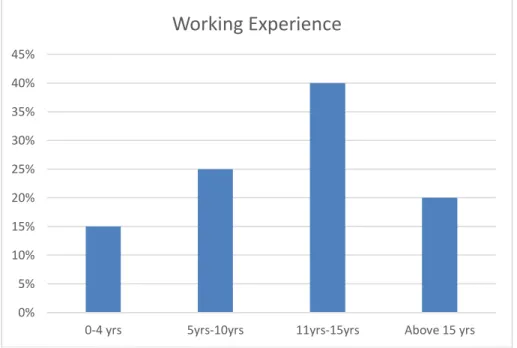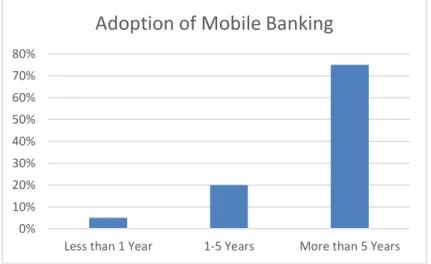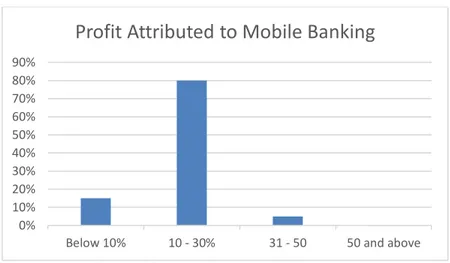Available online at https://sloap.org/journals/index.php/irjmis/ Vol. 4 No. 2, March 2017, pages: 74~80
ISSN: 2395-7492
https://sloap.org/journals/index.php/irjmis/article/view/449
The Effect of Mobile Banking on the Performance of Commercial
Banks in Nigeria
Hauwa Daniyan-Bagudu a Shazida Jan Mohd Khan b Abdul-Hakim Roslan c
Article history: Abstract
Received: 5 July 2016 Accepted: 30 January 2017 Published: 31 March 2017
Today, commercial banks are confronted with challenges that range from debt crises to the tight competition in the market. Customers’ impatience has increased considerably as they are more knowledgeable than before. Thus, the introduction of mobile services in the banking industry has added to the challenges facing commercial banks as they have to embrace the new technology or lose business. Mobile banking in Nigeria has completely transformed the banking industry and any commercial bank operating in Nigeria can only ignore that fact at its own risk. This study, therefore, aims to investigate the mobile banking effects on Commercial Banks financial performance in Nigeria. Simple random techniques were employed in this study in selecting 22 commercial banks. To facilitate the obtaining of relevant data that was used for analysis in this study, a structured questionnaire was used. Descriptive statistics involving simple graphical charts was applied in the presentation and analysis of data. The study, therefore, concludes that mobile banking positively and significantly affects the financial performance of commercial banks in Nigeria. The study recommends that commercial banks should keep adopting and using mobile banking in their operations because the number of people with access to a mobile handset is increasing every day.
Keywords: banking; banks; commercial; mobile; performance;
2395-7492© Copyright 2017. The Author. This is an open-access article under the CC BY-SA license (https://creativecommons.org/licenses/by-sa/4.0/) All rights reserved.
Author correspondence:
Hauwa Daniyan-Bagudu, College of Business,
School of Economics Finance and Banking, University Utara Malaysia Email address: hauwadaniyan77@gmail.com
a Doctorate Program, Finance and Banking, University Utara Malaysia
b Specialist in Banking structure and performance, Education system and policy, gender studies, School of Economics Finance and
Banking, College of Business, University Utara Malaysia
c Specialist in development issues; economic growth and development, poverty, and income distribution, Microfinance and Micro
Entrepreneurship, social business, and social capital and quality of life. Othman Yeop Abdullah Graduate School of Business, University Utara Malaysia
Daniyan-Bagudu, H., Khan, S. J. M., & Roslan, A.-H. (2017). The effect of mobile banking on the performance of commercial banks in Nigeria. International Research Journal of Management, IT and Social Sciences, 4(2), 1. Introduction
The terms used in carrying out banking transactions through mobile gadget such as a mobile phone is known as mobile banking (Anyasi & Otubu, 2009). Mobile banking is defined by Tiwari, Buse&Herstatt (2006) as any transaction (including the transfer of right or ownership to use goods and services) which is started and/or completed by using mobile access to computer networks with the assistance of an electronic gadget. Furthermore, they pointed out that mobile banking means the provision of bank-related financial services with the assistance of mobile telecommunication devices.
Recently, the financial services industry has been open to a historical transaction. E-development is evolving and advancing quickly in all areas of financial markets and financial intermediation among which are money, E-brokering, E-financing, E-insurance, E-exchange, E-banking, and even E-supervision. For the development of the banking industry, these new information technologies are becoming the most important factors.
In the financial institution sector, innovation has significantly propelled playing a key role in improving the standards of services. Days are a distant memory when customers would line in the baking halls waiting to pay their school fees, utilities, or any other financial transactions. This can now be done at their own convenience by using their ATM cards or using the internet from the comfort of their homes. More also, because of the tremendous development of the mobile phone industry, most financial institutions have wandered into the available opportunity and have associated with mobile phone network providers to offer banking system to their customers (Al-Jabri, 2012).
Mobile banking offers numerous features including the option of mobile banking but half of the world population have either failed to embrace mobile banking and financial services or they have been denied of the same (Anyasi&Otuba, 2009).Ivatury& Mas (2008) noted from their study in Kenya that, half of the total population of Kenya particularly the rural society do not have the knowledge of what mobile banking is. However, the effort of the mobile banking sector has been found to vary across the country (Ivatury& Mas, 2008).
Progression in information technology has changed how organizations conduct and operate their business over the past few years (Al-Jabri, 2012). Advancement in technology has led to the development of mobile banking and online banking in the banking industry which has changed the way which commercial banks conduct their business. Mobile banking and the internet have not just made financial organization provide banking services via mobiles and online, but they have provided their customers with easy access to financial services and other benefits.
As new technology becomes the request of the day and new advancement in the economymakes new opportunities which are difficult to assume, many organizations are searching for ways on how to embrace technology as a method for survival (Kingoo, 2011). The services of mobile banking can be used to raise proficiency and help business development through efficient, cheap and reliable money service support system that lessen the need for cash transaction and the associated risks (Anyasi & Otuba, 2009). The advantages of the cashless transaction including less opportunity for criminal and fraudulent activities, and mobile money technology (Wishart 2006) have expanded adoption rates, (Mbogo 2010). The main literature gap exists in revealing how mobile banking has affected the financial performance of the commercial banks in Nigeria. Therefore, this study sought to fill this knowledge gap by establishing the effect of Mobile Banking on the financial performance of Commercial Banks in Nigeria.
The determinant of financial performance of banks can be classified into external (macroeconomic) and internal (bank specific) factors (Al-Tamimi, 2010; Aburime, 2005). Internal factors are the characteristics of individual banks which influence their performance as it is fundamentally affected by internal decision management and the board. External factors are country-wide or sector-wide factors which are beyond the ability of the company to control and in turn, it affects the financial performance of the banks. In the last couple of decades, the overall financial performance of commercial banks in Nigeria has been improving (Oloo, 2010). Nevertheless, this doesn’t imply that all banks are profitable, there are banks that declare losses too (Oloo, 2010). Previous studies have shown that internal and external factors affect the performance of commercial banks (Flamini et al., 2009). Therefore, the investigation done in Nigeria by Olwney & Shipho (2011) concentrated on the sector-specific factors that influence the commercial bank's performance. However, the effect of mobile banking on the performance of commercial banks in Nigeria was not examined. Therefore, this study will be conducted with the expectation of filling this gap.
Some studies have been conducted on the effect of mobile banking on the performance of commercial banks. Tchouassi (2012) looked to see whether mobile phones truly work to extend banking services to the unbanked using empirical lessons from selected Sub-Saharan Africa Countries. The aim of the study is to discuss how mobile phones could be used to extend the banking services to the poor, unbanked and vulnerable population. The outcome of the study shows that vulnerable, poor and low income households in Sub-Saharan Africa countries frequently lacked access to bank account and confronted high cost for directing fundamental financial transactions. Mobile phone
introduced awesome opportunities for the provision of financial services to the unbanked. In addition to technological and economic innovation, policy and regulatory innovation were needed to make these services a reality.
2. Materials and Methods
This research is descriptive in nature as it uses a survey questionnaire in assessing the effect of mobile banking on the financial performance of commercial banks in Nigeria. To practically conduct a generous analysis of the data collected in the field research, the researcher uses descriptive statistics like charts to portray the applicable data. The primary source of data is used in this study whereby structured questionnaire was broadly used. The purpose is to create data about the effect that mobile banking has on the financial performance of commercial banks in Nigeria. The target population for the study was 22 commercial banks in Nigeria whereby one financial manager of each bank was picked as a respondent. Only 20 out of the distributed questionnaire was recovered from the respondents. This represents 91% response rate.
3. Results and Discussions 3.1 Respondents Characteristics
The below graph displays the respondents working experiences
Figure 1. Respondents working experiences
The above figure indicates that most of the respondents (8) has between 11-15 years of working experience (40%), while 5 (25%) of the respondent has 5-10 years of working experience. Above 15 years are 4 (20%) and only 3 (15%) has between 4 years of experience.
0% 5% 10% 15% 20% 25% 30% 35% 40% 45%
0-4 yrs 5yrs-10yrs 11yrs-15yrs Above 15 yrs
Daniyan-Bagudu, H., Khan, S. J. M., & Roslan, A.-H. (2017). The effect of mobile banking on the performance of commercial banks in Nigeria. International Research Journal of Management, IT and Social Sciences, 4(2), 3.2 Years of adoption of Mobile banking system
Figure 2. Adoption of mobile banking
From the above figure, most of the banks (75%) has adopted mobile banking more than 5years ago. 20% of the banks are using the service between 1-5 years while only 5% adopt mobile banking less than 1 year ago.
3.3 Financial performance
Figure 3. Bank profitability
As indicated in the above figure, 90% of the respondents believe that mobile banking system leads to an increase in the profitability of the bank while 10% felt the profit remains constant. None of the respondents believe that adopting mobile banking reduces their profitability.
0% 10% 20% 30% 40% 50% 60% 70% 80%
Less than 1 Year 1-5 Years More than 5 Years
Adoption of Mobile Banking
0% 10% 20% 30% 40% 50% 60% 70% 80% 90% 100%
Decrease Constant Increase
3.4 Profit attributed to mobile banking services
Figure 4. Profit attributed to mobile banking
The figure above indicates that 80% of the respondents believe that 10-30% of the profit of the banks is contributed by mobile banking. Only 15 % believe the profit contributed is below 10% and 5% felt it is between 31-50%. None of the respondents believe that mobile banking contributes more than 50% of profits to the banks.
4. Conclusion
From the above analysis, the study concludes that the price of mobile banking services has a positive influence on the financial performance of commercial banks in Nigeria. Mobile banking helped to promote efficiency and confidence in the financial system thus winning public trust. From the summary, the study recommends that banks should consider coming with clear and fair mobile banking prices which create a universal platform for all banking institutions. This will enhance fair market completion and thus bar financial institutions from customer exploitation. The study also recommends that the financial institutions should continue offering low transaction rates within their Mobile networks and ensure deposits of the various customers are protected at all times.
Conflict of interest statement and funding sources
The author(s) declared that (s)he/they have no competing interest. The study was financed by the authors. Statement of authorship
The author(s) have a responsibility for the conception and design of the study. The author(s) have approved the final article.
Acknowledgments
The authors thank all supporters for completing this paper to be published on IJCU Publishing. In term of the editorial team on International Research Journal of Management, IT & Social Sciences.
0% 10% 20% 30% 40% 50% 60% 70% 80% 90%
Below 10% 10 - 30% 31 - 50 50 and above
Daniyan-Bagudu, H., Khan, S. J. M., & Roslan, A.-H. (2017). The effect of mobile banking on the performance of commercial banks in Nigeria. International Research Journal of Management, IT and Social Sciences, 4(2), References
Aburime, T. (2008). Determinants of bank profitability: company-level evidence from Nigeria.
Al-Jabri, I. M., & Sohail, M. S. (2012). Mobile banking adoption: Application of diffusion of innovation theory. Journal of Electronic Commerce Research, 13(4), 379.
Al-Jabri, I. M., & Sohail, M. S. (2012). Mobile banking adoption: Application of diffusion of innovation theory. Journal of Electronic Commerce Research, 13(4), 379.
Al-Tamimi, H., & Hussein, A. (2010). Factors influencing performance of the UAE Islamic and conventional national banks.
Anyasi, F. I., & Otubu, P. A. (2009). Mobile phone technology in banking system: Its economic effect. Research Journal of Information Technology, 1(1), 1-5.
Flamini, V., Schumacher, M. L., & McDonald, M. C. A. (2009). The determinants of commercial bank profitability in Sub-Saharan Africa (No. 9-15). International Monetary Fund.
Ivatury, G., & Mas, I. (2008). The early experience with branchless banking.
Kingoo, N. (2011). Relationship between electronic banking and financial performance of commercial banks in Kenya(Doctoral dissertation, University of Nairobi, Kenya).
Mbogo, M. (2010). The impact of mobile payments on the success and growth of micro-business: The case of M-Pesa in Kenya. Journal of Language, Technology & Entrepreneurship in Africa, 2(1), 182-203.
Oloo, O. (2010). Banking Survey Report, The best banks this decade 2000-2009. Think Business Limited.
Olweny, T., & Shipho, T. M. (2011). Effects of banking sectoral factors on the profitability of commercial banks in Kenya. Economics and Finance Review, 1(5), 1-30.
Tchouassi, G. (2012). Can mobile phones really work to extend banking services to the unbanked? Empirical lessons from selected Sub-Saharan Africa countries. International Journal of Developing Societies, 1(2), 70-81.
Tiwari, R., Buse, S., & Herstatt, C. (2006). Mobile banking as business strategy: Impact of mobile technologies on customer behaviour and its implications for banks (Vol. 4, pp. 1935-1946). IEEE.
Wishart, N. (2006). Micro-payment Systems and Their Application to Mobile Networks: Examples of Mobile-enabled Financial Services in the Philippines. Infodev.
Biography of Authors
Hauwa Daniyan-Bagudu
Masters in Banking and Finance (MBF), Usmanu Danfodiyo University, Sokoto. Nigeria, 2007
Bachelor of Science Economics (Bsc. Econs), Usmanu Danfodiyo University, Sokoto. Nigeria, 2001
Email: hauwadaniyan77@gmail.com
Dr. Shazida Jan Moh’d Khan
Ph.D. Economics, Bangor University, United Kingdom, 2011
Masters Financial and Business Economics, University of Essex, United Kingdom, 1997
Bachelor Degree with Honours Economics, Universiti Utara, Malaysia, 1995
Pro. Dr. Abdul-Hakim Roslan
Ph.D., Economics, University of Wales, Bangor, United Kingdom, 2001.
Diploma, Foundations of Economics, The Economics Institute, Colorado, USA, 1994. Master of Economics, Universiti Kebangsaan Malaysia, 1990.


